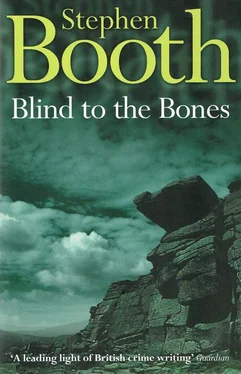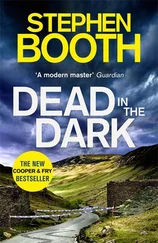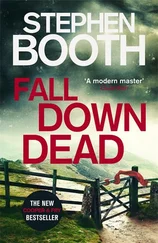‘Including a Stuart mansion,’ said Cooper. ‘But I suppose they didn’t care quite so much about those things in the nineteenth century.’
Udall laughed. ‘Nineteenth century, nothing. My dad remembers Crowden Hall. In fact, he has a photograph of it in a drawer somewhere. The hall was demolished in 1937 by Manchester Corporation.’
‘Damn.’
‘One of the pubs survived right into the 1960s. But that went, too. And only a couple of years ago, the water company spent £300,000 moving an entire farming operation a mile further up the hill at Crowden, to get it away from the road. They said it was to safeguard water quality from grazing sheep. They had to build a new house for the farmer in that case. But he was one of the lucky ones, I think. Entire communities have just disappeared from this area.’
Cooper looked back at the boats on Torside Reservoir. Presumably, sailing was an activity that could be trusted not to pollute the water.
‘And what about Withens?’ he said.
Udall shrugged. ‘I don’t know. But it doesn’t look like a place that will last, does it?’
At 7 Waterloo Terrace, Ruby Wallwin had cooked lunch for herself — stewed beef with new potatoes and baby carrots. But she made no attempt to eat what she’d cooked. She put the food on a plate and sat at the table, but didn’t touch a thing. Instead, she stared at the wall and listened to the clock, until her meal time was over. Then she disposed of the uneaten food, poured a half-drunk cup of tea down the sink and washed the pots, taking comfort from the feel of the hot water on her hands and the lemony smell of the washing-up liquid.
Afterwards, Mrs Wallwin turned on both her radios and the television. She had a radio in the kitchen, and another upstairs in her bedroom, while the TV was in the sitting room. It meant there was something she could hear in every room. She didn’t know what the programmes were that they were broadcasting — she needed them only for the sound of the voices. Some of those voices had become familiar, and were like friends chatting in the next room, waiting for her to join them. There were other times when she found the voices inside her house only made things worse. Then she would turn them all off, until she could no longer stand the silence again.
When she went out of the house, Ruby Wallwin always left a few lights on and a radio playing quietly. She didn’t do it to deter burglars — she had nothing worth stealing, after all. She did it so that the house wouldn’t be quite so dark and silent when she came back to it.
Yesterday, she’d been to the morning service at St Asaph’s. She had sat on her own, surrounded by empty pews. There were a few people of her own age in church, but Mrs Wallwin hadn’t lived in the village very long, so she didn’t feel able to sit with them, though they said ‘hello’ when they saw her.
Ruby Wallwin had particularly wanted to speak to the vicar, the Reverend Alton. She didn’t know him all that well, but he seemed like a decent man. She had taken her time leaving the church after the service, hoping that he would notice her. But Mr Alton had seemed very distracted, and he had disappeared into the vestry before she could get his attention.
Mrs Wallwin would have spoken to the vicar. She didn’t want to speak to the police.
Ben Cooper stood in front of the black brick terrace, watching the grey shapes of the wood pigeons that were flying in a small flock now, out over the fields and back again. The sound of the chainsaw that was still operating somewhere behind the houses only seemed to accentuate the eerie silence. Waterloo Terrace stood below the road, sheltered by its screen of trees as if it lay in a cocoon, separate from the rest of the village.
‘Do the Oxleys own these houses?’ he asked.
‘No, they’re rented,’ said Tracy Udall.
‘Council property?’
‘A private landlord.’
‘They’re a bit run-down, aren’t they?’
‘I don’t suppose the Oxleys are ideal tenants.’
‘No.’
‘Where would you like to start, Ben?’
‘My choice, eh? Let’s see the list again.’
Udall’s list was very organized. Number 1 Waterloo Terrace was recorded as being occupied by Mr Lucas Oxley. Strangely, numbers 2 and 3 were listed the same way. Why would Lucas Oxley need three houses? But then his family was rather large, according to Derek Alton.
There were certainly more Oxleys nearby. The fourth house in the terrace was occupied by Mr Scott Oxley, and number 5 was Ms Frances Oxley. But 6 and 7 provided a bit of variety — their occupiers were Mr and Mrs Melvyn Tagg, and Mrs Ruby Wallwin respectively. The eighth house was said to be unoccupied.
‘Who should we tackle first?’ said Cooper to himself. ‘Eeny, meeny or mo? Oxley, Oxley or Oxley? I wonder if they’ve ever thought of starting a firm of solicitors?’
He looked at the terrace of houses again. Logic dictated that he should start at number 1 and see if Mr Lucas Oxley was home again. But he wasn’t feeling logical today, and something told him it might be helpful to approach the Oxleys at a tangent. Besides, he could still remember the dog.
‘Number 7 it is, then. Mrs Wallwin.’
Closer to, the bricks weren’t really black at all. They had an almost purplish tinge, as if they had been steeped in blackberry juice. Number 7 showed few signs of decoration. Its paintwork was a sort of chestnut brown, or had been at one time. The combination with the black bricks was somehow depressing. There were lace curtains in the windows, which gave it an old-fashioned air. It might have been part of a setting for one of those urban townscapes painted by L. S. Lowry. After all, the painter had lived for a number of years at Mottram, down the valley, so it was possible he had seen Waterloo Terrace.
To reach number 7, Cooper and Udall had to pass a fenced-off area where six green wheelie bins were stored. They reached the front walls of the row of gardens. All the gardens were long and narrow, and all were overgrown, despite the past efforts at growing vegetables. They walked up the path, avoiding the nettles that were spreading from the soil on to the stone flags. Cooper took a quick glance at number 8, which was on the other side of one of the dark brick passageways. Its windows were dirty and curtainless, and it had an air of neglect. There was nothing more depressing than a house that had been left empty for a long time, and in Waterloo Terrace it was more depressing than ever.
‘I haven’t complained to the police about anything,’ said Mrs Wallwin, when she found Ben Cooper and Tracy Udall on her doorstep.
Cooper was surprised at the defensive note in her voice. Though she was slight and rather frail looking, she stood right on the step, as if she hoped to block the doorway. Many old people were far too trusting about who they opened their doors to. But not in Withens, it seemed.
‘Mrs Wallwin? Good afternoon. We just want to ask you a few questions,’ said Udall in her pleasant est manner. With most elderly people, her charm would have worked perfectly.
‘What about?’ said Mrs Wallwin.
‘May we come in?’
‘What for?’
‘It doesn’t matter,’ said Cooper. ‘Do you know a young man called Neil Granger?’
And Mrs Wallwin’s face softened a bit then.
‘Yes, of course I do. I know him and his brother. They used to live here.’
‘Here?’ said Cooper. ‘You mean here, in Waterloo Terrace?’
‘Next door. They were looked after by their uncle and aunt when they were teenagers. Their dad was sent to prison, and they never saw him again after he came out. Then their poor mother fell ill with cancer and couldn’t look after them herself.’
‘Their uncle and aunt would be Mr and Mrs Oxley?’
Читать дальше
Конец ознакомительного отрывка
Купить книгу












